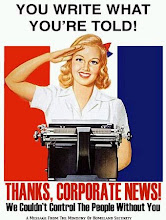Frum Sheldon Ramptons Blog; on Tue, 12/30/2008 - 15:49.
Topics: journalism
Alan Rusbridger, who edits the British Guardian, thinks fear of libel lawsuits from
big corporations may have contributed to journalists' failure to adequately report on the dangerous economic decisions that led to the recent implosion of the global financial system. In an article for the New York Review of Books, he recounts his own paper's "most recent serious brush with the British defamation laws" earlier this year when it was sued for libel by Tesco, one of the largest public companies in Britain and the fourth-largest retailer in the world.
The case centered around a report in the Guardian in which Rusbridger admits that the newspaper got some of its facts wrong. It reported correctly that Tesco was using complex financial deals to avoid paying taxes, but its reporters misunderstood the particulars of the arrangement, and "the sums avoided were much less than we had supposed."
The ensuing libel lawsuit from Tesco consumed more than a million dollars in legal fees, and threatened to go to millions more before it was settled out of court. "A full-scale defamation case develops an awesome momentum of its own," Rusbridger writes. "Letters rain in day after day, week after week -- drafted by counsel, amended by junior partners, redrafted by senior partners, few of them earning less than $500 an hour. Their tone is alternately sneering, bullying, threatening, and demanding. ... All this for a case where any damages would have been relatively insignificant."
Although Rusbridger admits that "this was a case in which the newspaper was on weak ground -- having its facts wrong," he points out that "there is no shortage of cases where news organizations, including several American media companies, have had to risk millions of dollars to protect solid reporting on matters of public interest." Moreover, he says the Guardian's error in this case was not malicious and is understandable, given that "the advanced tax planning undertaken today by most global companies is as intelligible to the average person as particle physics. This state of incomprehension extends to most journalists, editors, parliamentarians, and, importantly, company directors themselves -- executive and nonexecutive. It is the very problem these same people have in trying to understand the epidemic of 'innovative financial products.'"
Of course, the complexity and confusion surrounding modern finance is part of the reason why the system has collapsed this badly. But when journalists have to fear multi-million-dollar lawsuits if they even attempt to understand it all, Rusbridger warns that no one will even dare make the attempt.
This is a problem that John Stauber and I have been talking about for more than a decade. In a 1997 issue of PR Watch, we pointed out that "The corporate technique of suing people into silence and submission has become so popular that it even carries its own cute nickname in legal circles. Such lawsuits are known in lawyer lingo as 'SLAPP suits,' an acronym for 'strategic lawsuits against public participation.'"
This use of legal muscle to strongarm journalists contributes to the dumbing down of society, as reporters find that it is safer to write entertaining but pointless pap about Hollywood celebrities and random street crime than it is to do real investigative journalism about important and often complex issues that actually matter. As Rusbridger warns,
Whether we are dealing with banks, taxation, security, religion, or climate change, we need more than ever to find ways of encouraging, not penalizing, news organizations that try to report matters of the greatest complexity and significance. The financial crisis currently facing newspapers in America and Europe is grave and comes at a time when they are more needed than ever. In years to come people may not question why newspapers got things wrong about such complicated matters as corporate tax structures or the behavior of investment banks; they may express wonder that they even tried.
And corporations don't just SLAPP down journalists. They also use lawsuits to harass and intimidate activists and everyday citizens. Ultimately, therefore, these tactics attack not just journalism but democracy itself.
Click on title above to go to Sheldon Rampton's blog |
http://www.prwatch.org/blog/1
Saturday, January 3, 2009
Subscribe to:
Post Comments (Atom)












No comments:
Post a Comment